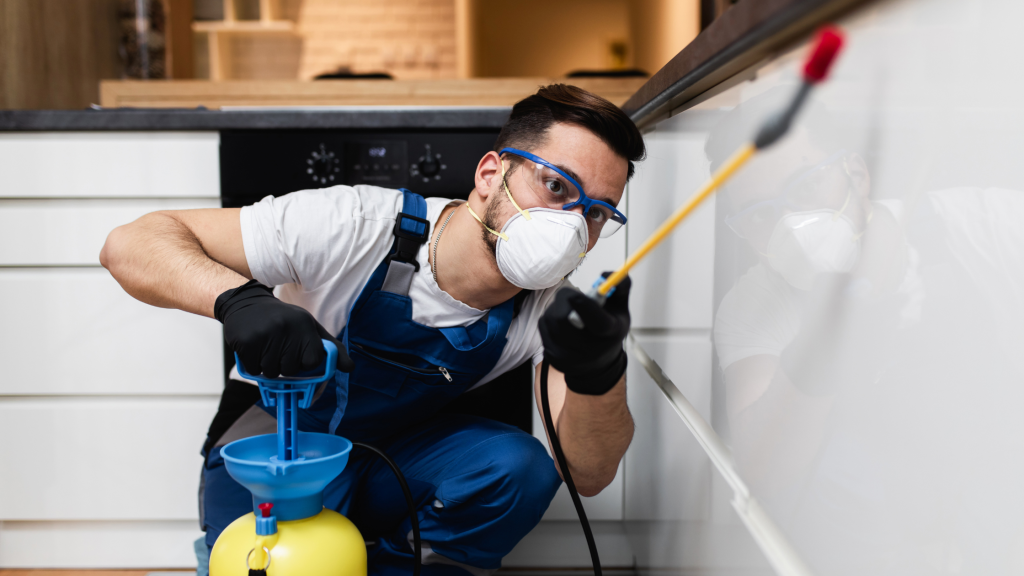Pest Control Clovis: Eliminate Vermin Finally
Pest Control Clovis: Eliminate Vermin Finally
Blog Article
Comprehending the Different Techniques to Parasite Control: A Comprehensive Guide

All-natural Insect Control Methods
Using eco-friendly techniques such as buddy planting and biological insect control is necessary for effectively handling insects in farming settings. Companion planting involves growing different crops in closeness to prevent pests, improve nutrient uptake, and boost overall crop wellness.
Organic insect control involves introducing all-natural killers or pathogens to regulate pest populations. Ladybugs, for example, feed on aphids, controlling their numbers without the need for chemical pesticides. One more instance is the usage of Bacillus thuringiensis (Bt), a bacterium that targets details insect bugs while being harmless to human beings, pets, and advantageous pests.
These green methods not only reduce the reliance on synthetic pesticides yet also help protect biodiversity and dirt health. By incorporating natural parasite control approaches into agricultural practices, farmers can attain sustainable parasite management while decreasing adverse influence on the setting.

Chemical Pest Control Solutions
In addition to all-natural pest control techniques, the application of chemical bug control services plays a substantial function in effectively taking care of pest populations in farming atmospheres. Chemical insect control options are formulated to target certain bugs that may trigger considerable damages to crops. These remedies often include synthetic chemicals that are developed to eliminate bugs quickly and effectively.
Among the crucial benefits of chemical insect control options is their efficiency in regulating bug problems widespread. Farmers can use these remedies making use of various methods such as splashing, fumigation, or seed treatment to shield their crops from harmful insects, weeds, and illness. In addition, chemical parasite control options are reasonably easy to apply and can supply rapid outcomes, helping farmers safeguard their returns and reduce economic losses.
Nonetheless, it is important to use chemical insect control solutions deliberately to reduce prospective negative effects on the atmosphere, non-target organisms, and human health and wellness. Appropriate application methods, adherence to security standards, and regular surveillance are crucial to make certain the liable use of chemical parasite control options in farming techniques.
Organic Insect Control Approaches
Biological pest control approaches leverage natural killers or virus to take care of pest populations in agricultural setups successfully. This technique offers a sustainable and green remedy to pest monitoring, minimizing the dependence on synthetic chemicals and lessening damage to the environment. One typical organic control strategy is the intro of all-natural adversaries, such as ladybugs or parasitic wasps, to target certain parasites. These killers eat the insects, assisting to regulate their check over here populations naturally - pest control clovis.
An additional organic control method includes making use of virus like infections, fungis, or microorganisms to infect and eliminate pests. In general, organic bug control approaches supply a lasting and targeted option to pest management in farming.
Integrated Bug Management (IPM)
Integrated Pest Administration (IPM) is a detailed method that incorporates numerous bug control strategies to efficiently manage and reduce pest populations in farming systems. IPM concentrates on long-term avoidance of parasites through a combination of biological, cultural, physical, and chemical control techniques. By integrating these various approaches, IPM aims to reduce reliance on chemical pesticides, minimize ecological impact, and advertise lasting pest monitoring practices.
One trick aspect of IPM is making use of biological controls such as natural predators, bloodsuckers, and microorganisms to control insect populations. This method utilizes the power of nature to keep an equilibrium between insects and their all-natural enemies without causing injury to the setting.
In addition, IPM entails social practices like crop rotation, hygiene, and habitat adjustment to produce unfavorable conditions for parasites and disrupt their life cycles. Physical controls such as composts, barriers, and catches are also used to avoid parasite infestations.
Mechanical and Physical Insect Control Methods
Utilizing non-chemical techniques, such as physical and mechanical pest control methods, is a crucial facet of extensive pest administration strategies, building upon the structure of Integrated Parasite Administration's all natural approach. Mechanical bug control includes making use of physical obstacles or catches to avoid pests from accessing and damaging crops or structures. This technique can include techniques like mounting screens on home windows, utilizing row covers in farming, or using sticky traps to capture bugs.
Physical insect control methods, on the other hand, concentrate on directly eliminating bugs via physical means. Making use of warmth treatments to remove bed bugs or vacuuming up parasites like ants or crawlers can be effective means to manage problems without the usage of chemicals. By incorporating these mechanical and physical bug control methods right into an Integrated Insect Administration strategy, experts and people can reduce reliance on chemicals while still efficiently lessening and taking care of pest populations damages.
Conclusion

In addition to natural parasite control methods, the utilization of chemical bug control solutions plays a substantial Continued function in successfully taking care of pest populaces in farming settings.One of the key benefits of chemical parasite control services is their performance in regulating bug infestations on a huge range.Integrated Parasite Management (IPM) is a thorough technique that combines different pest control strategies to effectively take care of and minimize pest populaces in agricultural systems.Making use of non-chemical approaches, such as physical and mechanical parasite control methods, is a vital aspect of comprehensive bug management methods, building upon the foundation of Integrated Bug Administration's alternative technique. By integrating these mechanical and physical bug control techniques into an Integrated Parasite Administration strategy, individuals and professionals can decrease reliance on chemicals while still efficiently handling pest populations why not try these out and minimizing damage.
Report this page